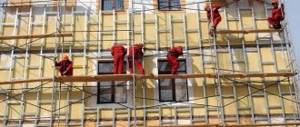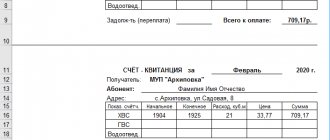What does the owner of non-residential premises in a residential building pay for?
The issue is truly controversial. On the one hand, you are members of the HOA, and accordingly, as the owner of the premises in the house, you are obliged to participate in the payment of general expenses. And even more so pay for major repairs. On the other hand, you don't use much.
In different HOAs this is decided differently: in some by law, in some by justice, in some by fraternity. This is regulated by the general meeting of homeowners and HOA members. Bring this issue to the meeting and try to defend your point of view. Or call an extraordinary meeting.
You will still have to pay for major repairs, since this issue is regulated by law, and not by the meeting.
How to convert residential premises on the 1st floor into non-residential ones?
Does the HOA receive income from businesses in the building?
Answered by lawyer, K. Yu. n. Yulia Verbitskaya:
In accordance with the Housing Code of the Russian Federation and the judicial practice that has taken place in accordance with it, the owner of non-residential premises in a residential building must, on an equal basis with the owners of residential premises, pay for major repairs of the house, and cleaning the entrance, and lighting in the entrance, and other expenses associated with the maintenance of the common property in an apartment building.
If you have installed individual metering devices, including your own electric line, you have the right to pay for this type of service yourself, notifying the management company about this and excluding payments for electricity in relation to your specific premises, which, however, does not relieve you of the obligation to participate in payment expenses for maintaining common property in an amount proportional to your share in the ownership of the entire house.
If you have two valid contracts with one subject and you are offered to enter into a third, then you need to familiarize yourself with their terms. No one has the right to receive money twice for the same service or impose it on you.
All disagreements that arise regarding the volume, cost of services provided and the person to whom you must pay them (especially when changing management companies) are subject to resolution in court.
Is it possible to change the calculation for heating non-residential premises?
How do you know if commercial organizations on the 0th floor are legal?
Anna Gorbenko, consultant to the real estate commission of the Consumer Society of St. Petersburg and the Leningrad Region, answers:
The owner of non-residential premises in an apartment building, just like the owner of residential premises, is obliged to pay for the maintenance of common property, regardless of whether he uses all the property or not (Article 39 of the Housing Code of the Russian Federation). Thus, you are obliged to pay.
For example, all entrances are illuminated, therefore, electricity costs are borne proportionally by all owners. As well as washing all stairs and flights.
The set of payments may vary in each specific case, for example, supplemented by the cost of servicing lifts for the disabled, and so on.
Leading legal consultant of Legal Services Center LLC Vladimir Brazhnikov answers:
Housing legislation does not contain differences in the legal status of non-residential and residential premises in the matter of maintaining common property and imposes equal responsibilities on the owners of any premises in the house, in accordance with Art. 39 Housing Code of the Russian Federation.
Consequently, the owners of both residential and non-residential premises are equally involved in the maintenance of common property.
The law establishes the obligation of individuals and legal entities to pay for utilities and major repairs in the house on time and in full.
The owner's payment for utilities and premises includes payments for the maintenance, as well as repairs of the premises (including for work and services through which the residential building is managed), payment for major repairs and routine repairs of property in an apartment building, in accordance with Art. .154 Housing Code of the Russian Federation. The amount of maintenance amounts paid depends on the size of the share of a particular owner in the right of common ownership of the common property.
Is it possible to remove the fence around a high-rise building?
Is there a tax deduction for the purchase of non-residential premises?
Thus, the owner of non-residential premises in a residential building is obliged to pay for the maintenance of common property, regardless of the amount and in what order he pays for the maintenance of his premises.
Having your own electrical line and contracts for cleaning and maintenance does not relieve the owner of non-residential premises from bearing the burden of expenses for maintaining the common property of the house. Non-residential premises cannot exist independently and are a structural part of a residential building.
The owner of non-residential premises, just like apartment owners, is obliged to make payments required by law on time and in full. At the same time, the actual non-use of common property by the owner of the premises does not relieve him of his responsibilities for maintaining the common property.
Yulia Dymova, director of the Est-a-Tet secondary real estate sales office, answers:
Theoretically, the owner of the non-residential premises does not use the common property of an apartment building. However, Article 36 of the Housing Code provides that, by right of common ownership, the owners of apartments and non-residential premises own load-bearing structures, equipment, as well as the land plot itself on which the house is located. Accordingly, the burden of maintenance also lies with them.
Text prepared by Maria Gureeva
Do not miss:
All materials in the “Good Question” section
Is it possible to register an office in an apartment?
I bought non-residential premises and converted them into residential ones. Can I get a tax refund?
How to convert an apartment from residential to commercial real estate?
The articles do not constitute legal advice. Any recommendations are the private opinion of the authors and invited experts.
Source: https://www.domofond.ru/statya/za_chto_platit_sobstvennik_nezhilogo_pomescheniya_v_zhilom_dome/7049
How to create an HOA
/ Apartment / Creating an HOA
If you want it done well, do it yourself. This slogan unites residents against dishonest management companies (MCs). Tired of the unsatisfactory work of management companies, people create homeowners' associations (HOAs).
HOA is one of the methods of managing an apartment building or residential buildings located on neighboring plots. It is a non-profit organization registered as a legal entity. The HOA is created for the purpose of:
- Joint management of common property;
- Ensuring its safety and the possibility of using it for its intended purpose;
- Possession, use and, within the legally established limits, disposal of common property.
All owners (individuals and legal entities) of residential and non-residential premises in the house can be members of the HOA.
The HOA is created on the basis of:
- apartment building;
- several apartment buildings in which the premises are owned by more than two owners. The land plots of these buildings must be located on a common plot or on several adjacent ones (adjacent to each other);
- several neighboring buildings, structures, structures, residential buildings (used for single-family residences), country houses (with or without plots), garages and other infrastructure facilities located on a common plot of land or on several adjacent plots.
Only one HOA can be created in one apartment building.
The creation of a partnership will be recognized as legal only after owners with more than 50% join it.
Preparatory stage
- Obtaining information from the BTI about all premises in the house and from the Federal Registration Service about the owners of these premises;
- Organization of a general meeting of owners of all premises: an announcement is posted at least 10 days before the event, notices are sent out indicating the initiators, place and time, agenda of the meeting to each owner (owners of residential and non-residential premises, shares in apartments);
- Receiving confirmation of delivery of notifications (postal receipts and checks, receipts);
- Collection of applications for joining the HOA and copies of certificates of ownership.
General open meeting of premises owners: first and subsequent
Full-time
Several lists of owners are prepared in advance, containing columns “For”, “Against”, “Abstained”: one for registering participants in the event and one for each question raised.
At the meeting, elections are held for the chairman and secretary of the HOA. The candidate with the majority of those present wins.
The meeting is chaired by the elected chairman, the minutes are filled out by the secretary.
In addition to the election of the chairman and secretary of the HOA, the agenda of the meeting includes the following issues:
- Creation of a homeowners association;
- Approval of the charter;
- Elections of members of the Board (only members of the HOA can be elected) and the Audit Commission (auditor);
- Definition of “one voice”. There are several ways to determine it: in proportion to the share of ownership of common property; one HOA member has one vote; the vote is equal to the number of premises owned by the HOA member; other methods.
The registration sheet for those present, the registration sheets and the protocol are a single document and are respectively stitched and stored together.
Based on the results of the meeting, the initiative group makes a calculation. The data is entered into a protocol in which it is advisable to indicate:
- information about each participant;
- information about the document that provides the basis for the emergence of ownership rights;
- data on the decision of each meeting participant on all issues on the agenda.
The protocol is signed by the chairman and secretary or each present member of the future HOA.
HOA meetings are considered valid if at least 50% of the owners of the premises are present, taking into account their share in the usable area of the building. If the turnout is less than required, the meeting is considered illegitimate and the process is repeated. The next meeting is scheduled no less than 2 and no more than 30 days after the first.
Owners who, for one reason or another, cannot attend the meeting, can give a power of attorney, written in simple written form, to any individual for the right to represent their interests at the meeting. The document must contain the following information:
- Full name of the owner of the premises;
- total area of the apartment;
- date and number of the certificate of ownership.
All decisions of a legitimate meeting must be posted for public viewing and are binding on all owners of the premises.
Extramural
The owners of the premises fill out the decision forms themselves and hand them over to the members of the initiative group. The results are analyzed and made public by posting them on a bulletin board. An absentee form of holding a meeting is appropriate for an apartment building in order to ensure a quorum.
Only forms submitted before the due date are counted.
Decision forms must contain information about:
- owner of the premises;
- a document certifying ownership of the premises;
- solutions for every issue. Answers are accepted in the form of “For”, “Against”, “Abstain”.
HOA registration
If the meeting of premises owners decided to create a HOA, it must be registered. The person authorized by the meeting (as confirmed by the corresponding entry in the minutes of the meeting) draws up the minutes of the meeting, makes two notarized copies of it and submits these documents to the tax authorities.
Next you need to submit to the registration authorities:
- application for state registration;
- original or notarized copy of the minutes of the general meeting of owners;
- HOA charter in 2 copies (documents must be bound, numbered and approved at the general meeting of owners);
- receipt for payment of state duty.
Start of operation of the HOA
The newly created HOA begins its activities with the following activities:
- opening a current account in any bank;
- providing bank details to the previous balance holder;
- organizing the procedure for transferring property under the control of a special commission consisting of representatives of local authorities and members of the HOA Board;
- acceptance of the building on the balance sheet of the HOA according to the acceptance certificate with the attachment of technical documentation for the building. All owners of the premises of the house remain the owners of the common property;
- informing local authorities about the creation of a HOA and the acceptance of the building on the balance sheet (Property Management Committee, City Services Department);
- concluding agreements with energy and water suppliers, contractors;
- calculation of utility bills.
Advantages of HOA
Reasons why you should organize an HOA:
- owners independently choose the method of performing certain works: with the involvement of third-party specialists, contractors, or on their own;
- if the HOA has claims against the contractor, it has the right to terminate the contract and find a new contractor as soon as possible;
- the list of necessary work is compiled by the members of the HOA independently;
- all members of the HOA have the right to control the expenditure of HOA funds;
- the partnership can independently dispose of the common property (for example, rent out part of the property as retail or advertising space, the funds received are used for general house needs);
- It is easier for owners to control the consumption of water, electricity and heat, that is, save;
- residents treat common areas more responsibly, since they will subsequently pay for repairs themselves;
- in the real estate market, apartments located in well-maintained buildings are more expensive;
- debt for utility services can be worked off by residents under a service agreement with the HOA;
- houses managed by HOAs have priority rights to participate in various programs for improvement, major repairs, etc.
Find out whether it is possible to sell a non-privatized apartment and what actions need to be taken to do this.
How to draw up a deed of gift for a share in an apartment - read here.
Disadvantages of HOAs
The main problems of the HOA:
- When creating an HOA, it is necessary to carry out land surveying - the issue is very controversial, the queue is huge. Without this, land ownership cannot be registered;
- the presence of owners (legal entities and local authorities) of basements, ground floors, attics and other things - the owners could use this property to make a profit. Without the ability to use these areas in the interests of residents, the creation of an HOA may prove unprofitable;
- It takes about 15 years to accumulate funds sufficient to carry out major repairs at the expense of residents. At the end of the year, the HOA (as a legal entity) will pay 24% of this amount as income tax;
- all expenses for maintaining common property are borne by residents, including landscaping;
- Debt for utility services can only be recovered through legal proceedings. The costs of resolving the dispute in court are paid by the HOA. Until full settlement with the debtor, expenses will be redistributed among bona fide payers;
- If citizens have benefits for paying for housing and communal services, then the city authorities are obliged to reimburse the HOA for the costs incurred. The period for receiving compensation is not defined;
- resistance of individual homeowners (for example, when paying additional fees for something);
- incorrect behavior of local authorities refusing to protect the interests of the HOA.
on the topic at the conclusion of the article:
Source: https://infonedvizhimost.com/kvartira/sozdanie-tszh/kak-sozdat-tszh.html
Individual owner of non-residential premises
608 of the Civil Code of the Russian Federation). At the same time, a citizen can carry out the activity of leasing property as an individual who is not an individual entrepreneur (hereinafter also referred to as an individual entrepreneur), since the law does not contain a requirement to register an individual as an individual entrepreneur as a necessary condition for leasing property owned by him.
Renting out premises is one of the “quiet” and profitable types of commercial activity. Under two conditions - the demand for real estate given its location and the availability of free funds for its purchase - you can ensure income for yourself with minimal risks for yourself.
Premises rental tax - payment procedure for non-residential and residential premises
or legal entity. for example, LLC. An individual can also rent out premises without registering as an individual entrepreneur, but provided that this premises is residential (for example, a house or apartment).
In this case, the individual transfers 13% of the rent to the budget.
If an individual intends to rent out non-residential premises, he must register an individual entrepreneur. Such conditions are explained by Russian legislation, which prohibits conducting business activities without state registration.
What is commercial real estate from the owner? Rights and obligations of the owner of non-residential premises in an apartment building
The right of inheritance is guaranteed.
Ownership of non-residential premises entails certain rights.
In fact, they are expressed in free, unhindered possession of the premises, using them at one’s own discretion, in accordance with the intended purpose of the object. The owner has the right not only to dispose of his property, but also to protect it from encroachment by third parties, including a lawsuit filed at the location of the premises (Art.
35 Arbitration Procedure Code of the Russian Federation)
Renting non-residential real estate: advice for renters
The business of leasing non-residential premises is usually profitable. How to maximize this benefit through taxes? This will be discussed in the article, which will be useful both for individual entrepreneurs and individuals who are already renting out real estate, and for those who are just planning to start this business.
The first question that arises usually concerns the method of registering non-residential real estate for subsequent rental.
What is commercial real estate from the owner?
Rights and obligations of the owner of non-residential premises in an apartment building
The owners of non-residential premises are an individual entrepreneur (IP) or a founder, a legal entity that has legally registered ownership of an object belonging to the non-residential fund and disposes of it within the limits established by law. Since the owner owns his share along with other persons sharing ownership of separate premises in the same building, regulations must be observed.
Who can the lessor be?
In accordance with Article 608 of the Civil Code of the Russian Federation, the right to transfer property for rent belongs to the owner . The owner can be: an individual, individual entrepreneur, or legal entity.
By renting out non-residential premises, an individual exposes himself to risk. Tax authorities classify this activity as entrepreneurial.
Entrepreneurial activity is considered to be activity carried out at one’s own risk and aimed at systematically obtaining profit from the use of property, sale of goods, performance of work, provision of services (Clause 1, Article 2 of the Civil Code of the Russian Federation).
The Civil Code regulates that
a person has the right to engage in entrepreneurial activity only from the moment of state registration as an entrepreneur.
To prevent questions from the tax authorities, you must register as an individual entrepreneur with the type of activity “Rental and management of your own or leased non-residential real estate.”
Is it necessary to register an individual entrepreneur for transactions with such real estate?
If an individual is registered as an individual entrepreneur, the question does not arise at all: everyone understands that entrepreneurs can rent premises for offices, shops, warehouses or workshops - and can, if possible, rent out such real estate. But is registration with the Unified State Register of Enterprises required in order to enter into such agreements?
In reality, no. Art. 608 of the Civil Code of the Russian Federation states that property can be leased either by the owner, or by a person authorized by him, or by someone who, by virtue of law, is granted the right to act on behalf of the owner. The law no longer mentions any additional restrictions (for example, the need to have individual entrepreneur status and register with the Unified State Register of Individual Entrepreneurs) and does not establish any barriers.
The mere fact of leasing real estate of any type is not enough to talk about entrepreneurship.
The Plenum of the Supreme Court of the Russian Federation in 2004, by resolution No. 23 concerning illegal entrepreneurship, clarified that if an individual has real estate, but he personally does not need it at this time, he has the right to use it, including for renting out (clause 2 resolutions). A similar position was expressed in paragraph 13 of the resolution of the Plenum of the RF Armed Forces No. 18 of 2006.
Thus, a one-time transaction is not enough to hold a citizen accountable for illegal business or to require him to urgently register with the Unified State Register of Individual Entrepreneurs. It is required that such transactions be systematic.
Details on the question of whether an individual can rent out non-residential premises
Russian legislation does not restrict the right of citizens to own real estate - and many people own non-residential premises. But how actively can they manage them?
Does a citizen have the right, in particular, to lease or rent this type of property? Let’s figure out what exactly the current law says about this.
For organization
Accordingly, from the point of view of current legislation, there is no prohibition on leasing real estate from an individual to a legal entity - and is not expected in the foreseeable future.
Are there any restrictions?
The only legal limitation for renting is the need to pay taxes. No one has canceled personal income tax - and therefore if an individual rents out non-residential premises, he will need to pay:
Is it possible to enter into an agreement as a tenant?
Another thing is that renting clearly commercial real estate can raise questions from regulatory authorities - and even provoke an audit. But the law itself does not contain a ban on such actions.
Conclusion
Thus, having owned non-residential real estate, a citizen has the right to rent it out without registering as an individual entrepreneur in the Unified State Register of Individual Entrepreneurs. If the transaction was a one-time transaction and has no signs of systematicity, the law does not establish any obstacles.
Questions may arise only in cases where the object bears clear signs of a commercial purpose - but even in this situation there is no direct legal prohibition.
+7 (St. Petersburg)
Source: https://mirovoj.okd1.ru/spravka/fizicheskoe-liczo-sobstvennik-nezhilogo-pomeshheniya/
What kind of agreement should a management company conclude with the owner of non-residential premises?
The type of agreement between the management company and the owner of non-residential premises depends on the method of managing the apartment building. If the house is managed by the MA, the same rules apply; if the HOA, residential complex, housing cooperative are different.
Watch a fragment of the webinar for our subscribers on the topic “Common mistakes in communicating with residents: practice, tips and examples”
The house is managed by the UO
The management company enters into a management agreement for the apartment building with each owner of the premises. The terms of the agreement are approved by the general meeting of owners of premises in the house. These conditions are the same for all owners (Part 1 of Article 162 of the Housing Code of the Russian Federation).
The law does not provide for a special agreement for owners of non-residential premises.
At the same time, the management agreement for an apartment building must contain provisions that specifically apply to the owners of non-residential premises in the apartment building. There are two such special provisions:
- the owner’s obligation to conclude in writing resource supply agreements with resource supply organizations and an agreement for the provision of services for the management of MSW with the regional operator;
- consequences in case the owner does not conclude contracts.
This requirement is provided for in paragraph 14 of subparagraph “p” of paragraph 31 and paragraph 9 of subparagraph “k” of paragraph 148(22) of Rules No. 354.
If your apartment management agreement does not contain these provisions, it is worth including them in the text. This will save you from unnecessary disputes and misunderstandings with the owners. We teach how to avoid problems with drawing up a contract in courses on managing apartment buildings.
- How to interact with the owner of non-residential premises
The house is managed by a homeowners association, residential complex or housing cooperative
The answer to the question of whether to enter into an agreement with the owner of non-residential premises depends on whether such owner is a member of a housing association or not.
If the owner is not a member of the HOA, housing complex, housing cooperative, enter into an agreement with the owner for the provision of services for the maintenance and current repairs of common property in the apartment building (Part 6 of Article 155 of the Housing Code of the Russian Federation).
If the owner is a member of a housing association, then no agreement is necessary. Members of homeowners' associations, housing complexes, housing cooperatives make mandatory payments for the maintenance and current repairs of common property in the apartment building in the manner established by the governing bodies of the partnership or cooperative (part 5 of article 155 of the Housing Code of the Russian Federation).
- Direct contracts with resource supply organizations and direct payments for utilities
Resource supply agreements with non-residential premises
From January 1, 2020, by Decree of the Government of the Russian Federation of December 26, 2020.
No. 1498 “On the issues of providing utility services and maintaining common property in an apartment building”, the MA/HOA/housing association is excluded from the scheme “non-residential premises - provider of public utilities (UO/HOA/HOSK) - resource supplying organization".
Now, owners of non-residential premises are required to independently enter into contracts with resource supply organizations (RSOs) and pay them for consumed utility resources.
However, as practice shows, despite the entry into force of the new norms more than a year ago, not all RSOs have begun to work with the owners of non-residential premises, and many management companies/homeowners' associations/housing cooperatives continue to present payment to such owners for the cost of consumed utilities. Let's try to understand the problems that arise during the transition from contracts with a management company/homeowners' association/housing cooperative to contracts with RSO.
New norms and positions of courts
In accordance with paragraph 3 of clause 6 of the Rules for the provision of utility services to owners and users of premises in apartment buildings and residential buildings, approved by Decree of the Government of the Russian Federation of May 6, 2011 No. 354 (hereinafter referred to as Rules 354) as amended, effective from 01.01.
2017, the supply of cold water, hot water, thermal energy, electrical energy and gas to non-residential premises in an apartment building (MKD), as well as the disposal of waste water, is carried out on the basis of resource supply agreements concluded in writing directly with the resource supplying organization .
It would seem that everything is clear - from January 1, 2020, RSOs must provide utility services in non-residential premises, and management companies/homeowners' associations/housing cooperatives, accordingly, lose the right to provide such services from the same date. However, it is necessary to pay attention to several nuances.
Paragraph 4 of clause 6 of Rules 354 imposes on management organizations, homeowners' associations, housing cooperatives the obligation to notify the owners of non-residential premises about the need to conclude an agreement directly with the RSO, and to send information about the owners of non-residential premises to the RSO.
It is important to note that the period for sending such a notification is not regulated; accordingly, holding the management organization accountable for failure to send or untimely sending will be quite difficult, and most likely impossible.
However, it is precisely the failure of the management company/homeowners association/housing association to fulfill this obligation that can be accepted by the courts as a basis for recognizing as valid the contract for the provision of utility services concluded specifically between the management organization/homeowners association/housing association and the owner of non-residential premises in the apartment building, and, accordingly, recognizing the fact that there is no legal relationship between this owner and RSO.
Thus, in the Resolution of the Thirteenth Arbitration Court of Appeal dated March 5, 2020 No. 13AP-33733/2017 in case No. A56-55921/2017, a claim for debt collection under a heat supply agreement was considered, since the homeowners’ association had not fulfilled its obligations to timely pay for the supplied heat energy .
The essence of the dispute was that the HOA did not make payments under the heat supply agreement regarding non-residential premises. The partnership referred to paragraph 6 of Rule 354, but did not send a notice to the owners, did not provide information to the RSO, and did not make any other changes to the agreement regarding non-residential premises.
The court collected the resulting debt; the appeal ruling declared the decision of the first instance court to be justified and not subject to change.
In the Resolution of the Arbitration Court of the Volga-Vyatka District dated March 05, 2020 No. F01-6032/2017 in case No. A28-3497/2017, the court indicated that “ the absence of a direct agreement between the owner of non-residential premises and the resource supply organization during the disputed period does not relieve the management company from the obligation to pay the utility resource supplied to apartment buildings in full .” Additionally, the court about. The court also took into account that “since Resolution No. 1498 does not contain any rules regarding the timing of concluding agreements between the owners of non-residential premises in MKD and resource supply organizations in writing, and also does not establish the timing of the transfer by management organizations of information about the owners of non-residential premises in the RNO, Until the termination of the contract for the provision of utility services concluded with the management company, the owner of non-residential premises may pay a fee to the management company .”
According to the position of the court, set out in the Resolution of the Thirteenth Arbitration Court of Appeal dated March 5, 2020.
No. 13AP-766/2018 in case No. A56-73290/2017, the management organization is obliged to take measures aimed at concluding with the owners of non-residential premises separate resource supply agreements with resource supply organizations, which include, in particular, sending notifications and information provided for in paragraph 6 of the Rules 354. The specified list of activities established by paragraph 6 of Rules 354 is exhaustive, specific and must be carried out by the Company as a provider of public services in apartment buildings managed by the applicant. In the said Resolution No. 13AP-766/2018 o. Notification to the owner of non-residential premises must be individual in nature and cannot be intended for an indefinite number of persons. Additional posting of this information on the website or in public places of the MKD will not constitute a violation, but has no legal significance.
Uncertainty of the date of conclusion of the agreement with RSO
It is important to take into account that if a notice is not sent to the owner or information is not provided to the RSO, this is not an obstacle to concluding an agreement . The conclusion of an agreement with the RSO can be initiated by the owner of the non-residential premises. According to clause
23 of Rule 354, the owner of premises in an apartment building and the owner of a residential building (household) have the right to initiate the conclusion in writing of an agreement containing provisions for the provision of utility services. It is worth pointing out that, based on the interpretation of the rules, the “obligation” to initiate the conclusion of a written agreement is assigned to the owner of the non-residential premises.
However, there are no direct prohibitions on the fact that the resource supply organization can initiate the conclusion of an agreement.
Clause 18 of Rule 354 provides that if the contractor providing utility services to consumers in an apartment building in which the owner’s non-residential premises is located is not a resource supplying organization, the owner of the non-residential premises in the apartment building is obliged within 5 days after concluding resource supply contracts with resource supply organizations provide the contractor with copies of them , as well as in the manner and within the time limits established by these Rules for the transfer by consumers of information on the readings of individual or common (apartment) meters - data on the volumes of utility resources consumed during the billing period under these contracts.
It is worth mentioning paragraph 7 of Rules 354, which provides that an agreement containing provisions for the provision of utility services, concluded through the performance of implied actions by the consumer, is considered concluded under the conditions provided for by Rules 354.
It would seem that from the above norm it follows that the very fact of consumption of a utility service by a consumer, including the owner of a non-residential premises, means the conclusion of an agreement for the provision of a utility service. And since the person obliged from 01.01.
2017 to conclude such an agreement with the owners of non-residential premises is the RSO, then the agreement between the RSO and the owners of non-residential premises is concluded, regardless of its signing in writing and regardless of the actions of the management authority/homeowners association/housing cooperative in sending notifications to the owners of non-residential premises.
However, it should be noted that Rules 354 establish that it is not an agreement for the provision of utilities, but a resource supply agreement, that is concluded between the RSO and the owner of non-residential premises .
Taking this into account, the question of the possibility of concluding a resource supply agreement with the RSO through the commission of implied actions by the owner of a non-residential premises (consumption of a communal resource) becomes ambiguous.
We will talk about the features of resource supply agreements concluded between the owners of non-residential premises and RSO in one of the following publications on the AKATO website. In this article , emphasis is placed on indicating the type of agreement only for the purpose of warning against the dubious conclusion about concluding an agreement with RSO by performing implicate actions.
Owners of non-residential premises and management company: the foundations of harmonious relations
From January 1, 2020, the nature of the relationship between the organization managing the apartment complex (managerial association, homeowners association, residential complex, housing cooperative) and the owner of non-residential premises has changed.
Previously, such an owner had two options to receive utility services: in the general order through a management company, homeowners' association, residential complex, housing cooperative, or under an agreement with a resource supply organization (RSO). Now the owner is obliged to enter into resource supply agreements directly with the RSO. The organization managing the apartment building acts as a connecting link in these relations. She no longer provides utilities to non-residential premises, but at the same time she has new responsibilities.
- How does the owner of non-residential premises in an apartment building pay for housing and communal services?
Download useful sample documents:
Notification to the RSO about the owners of non-residential premises in apartment buildings
Agreement for the provision of services for the management of municipal solid waste
Notification of the need to obtain a contract for the provision of utility services
Letter to the resource supplying organization regarding the decision to pay utility bills directly to the resource supplying organization
You can find even more useful forms and samples.
Now MA, HOA, residential complex, housing cooperative must:
- notify the owner of non-residential premises of the need to conclude agreements with the RSO and the MSW reoperator;
- obtain a number of documents and information from the owner;
- transfer information about the owners of non-residential premises in the apartment building to the RSO and the TKO reoperator.
You can understand the topic in more detail at our advanced training courses:
- Accounting and taxation in the management of apartment buildings (72 hours)
- For management organizations - Management of an apartment building by a management organization (72 hours)
- For housing associations – Management of an apartment building by a housing association (72 hours)
Such changes to the legislation were made by Decree of the Government of the Russian Federation of December 26, 2020 No. 1498 “On issues of providing utilities and maintaining common property in an apartment building.” This resolution included the above responsibilities in the Rules for the provision of utility services to owners and users of premises in apartment buildings and residential buildings, approved by Decree of the Government of the Russian Federation of May 6, 2011 No. 354 (hereinafter referred to as Rules No. 354).
Watch a fragment of the webinar for our subscribers on the topic “Transition to direct contracts between RSO and the consumer”
Attention: the conclusions of this recommendation do not apply to owners of parking spaces. MAs, HOAs, residential complexes, housing cooperatives interact with these owners in the same manner as with the owners of residential premises in apartment buildings.
Who should commission and seal the IPU, which is installed in the non-residential premises of the apartment building?
Work on putting the IPU into operation should be carried out by RSO.
The supply of cold water, hot water, thermal energy, electrical energy and gas to non-residential premises in the apartment building, as well as the disposal of waste water, occurs on the basis of agreements with RSO. Such agreements must be concluded in accordance with the rules of legislation on water supply, sanitation, electricity supply, gas supply, and heat supply. This is provided for in paragraph 3 of paragraph 7 of Rules No. 354.
Decree of the Government of the Russian Federation dated July 29, 2013 No. 643 approved a standard hot water supply contract. Clause 13 of the agreement provides for the obligation of RSO to authorize hot water metering devices (metering units) for operation. Clause 19 establishes the obligation to seal metering devices.
- Complaints about the management company: where can residents turn?
How to transfer information about the owners of non-residential premises to the RSO and the MSW reoperator
You are required to provide information about the owners of non-residential premises to resource supply organizations that supply utility resources to apartment buildings, and to the regional operator for the management of solid waste. This is provided for in paragraph 4 of paragraph 6 and paragraph 5 of paragraph 148(1) of Regulation No. 354.
To fulfill this obligation, compose a message indicating:
- addresses of apartment buildings where non-residential premises are located;
- list of premises;
- Full name or name of the owners of the premises.
Tip: if you have additional information about the owners, also include it in the message. For example, phone numbers or other contacts of owners. This will save you from unnecessary questions from the RSO and the MSW registrar.
Send the message by mail, deliver it to the addressee's office, or transmit it in any other convenient way. The main thing is that the method confirms the fact that the addressee received the information.
Deliver this message to each recipient once. But if information about the owners of non-residential premises changes, the management company will need to provide updated information.










